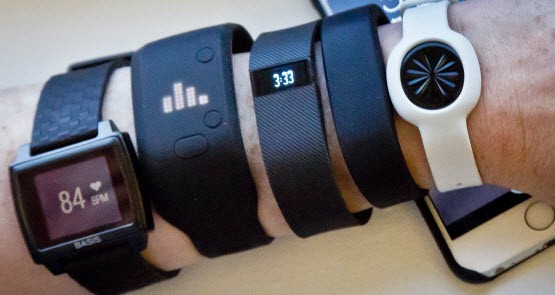

Qantas really took the media for mugs today with its ‘earn points walking’ media release, not that the scheme isn’t without some compelling merits for investors.
First, the frivolous bits.
It all began with this press release, about how users of wearable physical activity monitoring devices could under a new Qantas scheme, earn points for walking, working up a sweat, and come to think of it, having sex.
Cue “Fornicate your way to LA” headlines in the tabloids, assuming there is anyone left in them after the latest round of bloodletting in the already gutted news rooms.
But No, it isn’t about screwing your way to a free ticket for two, or who knows, maybe three, to London, given the exhaustive implausibility of earning enough points in several life times and thousands of petites morts to become so indulged by the frequent flyer redemption Gods.
It’s about Qantas finding lucrative ways of keeping its valuable (data based marketing) loyalty program going despite mishaps like its ejection from the Woolworth’s Everyday Rewards program for those who want to get screwed over by overpriced groceries and the linked purchases of petrol. Not to mention whatever the Reserve Bank might also do to the program through reforms to the way credit and charge cards involve themselves in such schemes.
Qantas Assure is to be a Qantas branded range of NIB health insurance products, hooked up to wearable physical activity devices as an inducement to the innumerate, while accessing their premiums.
As the media release says; “Qantas Assure is targeting a 2-3 per cent share of the Australian private health insurance market on a revenue basis in its first five years.”
Think about that carefully, or if you are a shareholder, with awe. Qantas Group revenues in the financial year to 30 June were $15.8 billion. According to APRA in its detailed review of competition in the private health insurance sector, that industry had total premium revenues of $19.3 billion in a comparable period, which means with a bit of rounding that Qantas sees this as worth between $400-600 million in today’s dollars before the end of the decade.
At the prices it holds for options or purchase rights on Boeing 787s that’s almost another four to six Dreamliners with extras left over for dessert. (Qantas screwed Boeing royally on price in 2005, no-one else is going to get 787s at anything like it signed for.)
Qantas making more out of private health insurance and other smart exercises in leveraging its brand value has been the stuff of dreams for legacy airline managements worldwide for decades.
But back to the frivolities. Not only did the media go ‘gee, wow, points for walking ‘n pumping ‘n whatever’, but it took the bait offered by a site called Unfit Bits which offered to help points junkies game the system by putting wearables on their dogs, power tools and quite possibly if one was to drill down enough, playground swings and runabouts and maybe the rear axle of a bus! (One of the illustrations on the Qantas web site implies you get around three points for 8000 steps, so the bus option is worth considering, but only if your ambulance, major trauma and possibly legal insurances are all up to date.)
The Unfit Bits site dates back to at least May and was created as a bit of fun by some New York artists. And there is no doubt the Qantas branded NIB products can be gamed, as if it would have any real reason to worry about that.
The benefits to public health are obvious. Big tick to Qantas for that. But at the minuscule earning rates that seem in the offing for linked activity monitors, it’s doubtful that it would care less if someone was to spoof the data from anklets attached to a entire AFL team if it can secure a slice of their health premiums and associated and valuable marketing data benefits.
The how-to-spoof site says stuff like;
Free your fitness data from yourself.
Earn insurance discounts!
A guide to fitness tracker solutions.
Does your lifestyle prevent you from qualifying for insurance discounts?
Do you lack sufficient time for exercise or have limited access to sports facilities?
Maybe you just want to keep your personal data private without having to pay higher insurance premiums for the privilege?
Unfit Bits provides solutions. At Unfit Bits, we are investigating DIY fitness spoofing techniques to allow you to create walking datasets without actually having to share your personal data. These techniques help produce personal data to qualify you for insurance rewards even if you can’t afford a high exercise lifestyle.
Our team of experts are undertaking an in-depth Fitbit Audit to better understand how the Fitbit and other trackers interpret data. With these simple techniques using everyday devices from your home, we show you how to spoof your walking data so that you too can qualify for the best discounts. Our new range of desktop fitness devices are also available on this site.
And it is an amazingly slick site, perfectly attuned, some might say, to the shallow end of the consumer gene pool.
Full marks to Qantas however for understanding the do-anything-for-points ethos of the less than numerate legions that inhabit the frequent flyer data bases. (Including the writer!)








Crikey is committed to hosting lively discussions. Help us keep the conversation useful, interesting and welcoming. We aim to publish comments quickly in the interest of promoting robust conversation, but we’re a small team and we deploy filters to protect against legal risk. Occasionally your comment may be held up while we review, but we’re working as fast as we can to keep the conversation rolling.
The Crikey comment section is members-only content. Please subscribe to leave a comment.
The Crikey comment section is members-only content. Please login to leave a comment.